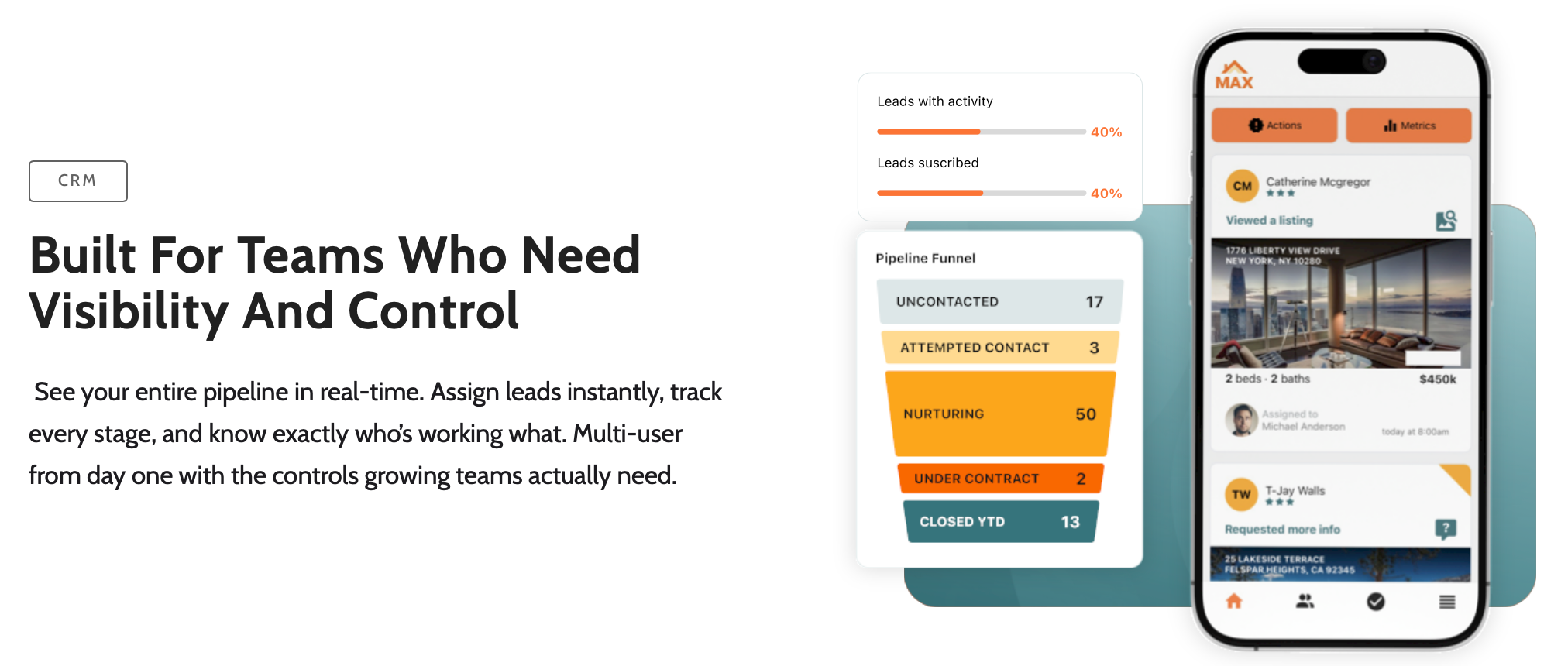Smart Lead Routing for Real Estate: Matching Leads to the Right Agent
Real estate teams pour immense resources into lead generation, but often overlook a critical step: where those leads go next?
A slow or mismatched lead assignment process can quietly drain your revenue, letting high-intent prospects slip through the cracks. In a competitive market, you can’t afford to have your best leads waiting for a response or ending up with the wrong agent.
Smart lead routing for real estate automatically assigns incoming leads to the most appropriate agent based on predefined criteria like location, availability, expertise, and lead source. By implementing effective lead routing, you not only improve response times but also create better customer experiences and ultimately boost conversion rates.
This guide explains how smart lead routing works, why it’s essential for scaling real estate businesses and teams, and how you can implement it to ensure every lead gets the attention it deserves, faster.
What is Smart Lead Routing in Real Estate?
Lead routing is the process of distributing incoming leads among your agents. Basic lead distribution might involve a simple round-robin system or a “first-to-claim” model—these are common lead routing strategies, but they often have limitations such as uneven workload distribution or missed opportunities.
Smart lead routing, however, is more intelligent. It uses automation and specific criteria, enabled by lead routing software, to strategically assign each lead to the agent best equipped to handle them.
For real estate teams, smart lead routing goes beyond manual assignments and creates a system that considers multiple factors to make the perfect match. This automated lead assignment ensures that a lead interested in a luxury downtown condo connects with your high-rise specialist, not the agent who primarily handles suburban single-family homes.
Common routing methods include:
- Round-Robin: Distributes leads evenly among a group of agents.
- First-Available: Assigns leads to the next agent who is available to respond.
- Skill-Based: Routes leads based on an agent’s expertise (e.g., first-time homebuyers, commercial properties).
- Geographic Routing: Assigns leads based on their desired neighborhood, city, or ZIP code.
Why Smart Lead Routing Matters for Conversion Rates
An optimized lead routing process directly impacts your bottom line. By ensuring high-intent leads are handled by agents best equipped to convert them, you create a more efficient and effective sales pipeline.
Here’s why it’s so important:
- Faster Response Times: The first agent to respond often wins the business. Automated lead distribution minimizes delays, connecting prospects with an available agent almost instantly. Monitoring agent response times is essential for evaluating and optimizing your lead routing strategy, ensuring leads are handled as quickly as possible.
- Better Agent-Client Matching: When a lead is matched with an agent who understands their specific needs, location, and property type, it builds immediate rapport and trust. This leads to stronger client relationships from the very first conversation.
- Reduced Friction: Smart routing eliminates the chaos of agents claiming leads or managers manually assigning them. This smooths out your internal workflow automation, allowing your team to focus on selling.
- Increased Accountability: With clear assignment rules, there’s no question about who is responsible for each lead. This visibility ensures no prospect is forgotten and every agent is accountable for their lead follow up, supporting consistent and effective engagement.
How Smart Lead Routing Works Behind the Scenes
A robust real estate CRM with smart lead routing capabilities is essential for integrating advanced lead management features. These real estate CRMs allow you to set up rules that automatically distribute and match leads with the most suitable agents using automation, based on the criteria that matter most to your business.

Routing Criteria Real Estate Teams Can Set
- Property Type Expertise: Assign leads looking for condos, luxury homes, or new construction to agents who specialize in those areas, taking into account each client’s specific property preferences for more accurate matching.
- Geographic Territory: Route leads based on specific neighborhoods, ZIP codes, or even school districts to your local experts.
- Lead Source: Prioritize leads from high-converting sources (like your IDX website) by sending them to your top-performing agents.
- Experience Level: Ensure complex or high-value leads are handled by senior agents, while newer agents can practice on different lead types.
- Availability: Distribute leads to the most appropriate team member who is online and ready to respond immediately, factoring in work hours and vacations.
- Performance History: Reward your top closers by routing more or higher-quality leads their way.
Automation Triggers
These rules are triggered in real-time by prospect actions, such as:
- Form submissions on your website
- Specific IDX search behavior (e.g., saving a property)
- Inbound calls that generate inbound leads
- Live chat interactions
Types of Smart Lead Routing Strategies
The best lead routing strategy depends on your team’s size, structure, and goals. Each routing method offers unique advantages, and many teams use a hybrid approach.
- Round Robin Routing: This routing method is the simplest, ensuring an even distribution of new leads among a select group of agents. It’s fair but doesn’t account for agent expertise or performance.
- Geography-Based Routing: This routing method is ideal for brokerages covering large areas. It connects leads with the right agents who have deep knowledge of the local market in a particular neighborhood, increasing their value and expertise.
- Skill-Based Routing: This routing method assigns leads based on an agent’s specialty, such as language proficiency, certifications (e.g., ABR®, SRES®), or experience with certain buyer profiles like veterans or investors.
- Performance-Based Routing: This routing method is a powerful way to incentivize your team. It directs a higher volume of leads—or more valuable leads—to your top-performing agents based on their conversion rates or sales volume, helping your business generate more leads and drive growth.
- Availability-Based Routing: In a world of instant gratification, this routing method is key. It routes leads to agents who are currently available, drastically reducing real estate response time and impressing potential clients.
Features of Lead Routing Tools
Lead routing tools are essential for real estate teams looking to streamline their lead management process and ensure every incoming lead is matched with the right real estate agent.
Here are some of the key benefits and features that make lead routing tools invaluable for real estate professionals:
Intelligent Lead Routing
Advanced lead routing logic automatically matches leads to the most suitable agents based on predefined criteria such as location, property type, lead source, and agent expertise. This ensures that every new lead is connected with the right real estate agent for their needs.
Lead Scoring and Qualification
Built-in lead scoring systems help qualify leads by assigning a lead score based on their engagement, behavior, and interest level. This allows real estate teams to prioritize high-value leads and route them to top-performing agents, increasing the chances of lead conversion.
Automated Lead Distribution
The system can distribute leads to multiple agents or assign them to a single agent, ensuring fair and equal distribution. This reduces the risk of missed opportunities and helps balance workloads across the team.
Customizable Lead Routing Rules
Real estate teams can set up custom lead routing rules to fit their unique business needs. Whether routing leads based on agent availability, expertise, or geographic area, these rules ensure that each lead is handled by the most appropriate agent.
Real-Time Notifications
Agents receive instant alerts when a new lead is assigned, enabling them to respond quickly and follow up before competitors do. This speed to lead is critical for maximizing lead engagement and conversion rates.
Lead Tracking and Analytics
Comprehensive tracking and analytics dashboards allow teams to monitor lead performance, track key metrics like response times and conversion rates, and analyze lead sources. This data-driven approach helps teams refine their lead routing strategy and improve overall results.
CRM and Marketing Tool Integration
Seamless integration with customer relationship management (CRM) systems and marketing tools ensures that all lead information, follow ups, and communication history are centralized. This makes it easier for agents to manage their pipeline and maintain consistent client satisfaction.
Round Robin Routing
This feature ensures that leads are distributed evenly among agents, supporting fair and equal distribution and preventing any one agent from becoming overwhelmed. It also helps maintain a steady lead flow for all team members.
First-to-Claim Routing
For teams that value speed, first-to-claim routing allows the first available agent to claim a new lead. This method ensures that leads are responded to quickly, reducing the risk of cold leads and missed opportunities.
Top takeaway: Whether you’re managing a small team or a large real estate business, investing in a robust lead routing tool can help you route leads more effectively, improve follow ups, and deliver a superior client experience.

Signs Your Team Needs Better Lead Routing
If you’re experiencing any of the following issues, it’s a clear sign that your current lead management process is holding your real estate team back:
- Slow Response Times: Leads wait hours or even days for a follow-up.
- Missed Opportunities: You forget leads (especially cold leads), or let them fall through the cracks.
- Mismatched Assignments: Your luxury property expert is getting first-time homebuyer leads, and vice-versa.
- Uneven Workloads: Poor lead distribution overwhelms some agents and leaves others with nothing to do.
- Declining Conversion Rates: Your team is struggling to convert leads into appointments and clients.
Metrics to Track When Optimizing Your Lead Routing Process
To measure the success of your smart lead routing strategy, you need to track the right KPIs. Optimized lead routing improves both team performance and the customer experience, and these metrics will prove it.
- Lead Response Time: The average time it takes for an agent to make initial contact.
- Conversion Rate by Agent: Which agents are most successful at converting leads into clients?
- Appointment Booking Rate: The percentage of leads that result in a scheduled appointment.
- Lead-to-Close Ratio: The number of leads it takes to secure a single closed deal.
- Agent Workload Balance: An overview of how many leads each agent is actively handling. Ongoing training is essential to ensure agents continually improve their lead routing outcomes.
- Lead Scores: Actively track how your system prioritizes and routes leads based on value or urgency.
- Lead Qualification: Monitor how effectively you assess leads and categorize them based on readiness, interest, and intent.
How to Implement Smart Lead Routing in Your Real Estate CRM
Here’s a simple framework:
- Define Your Routing Rules: Determine the criteria for assignment. Will you route by location, price point, lead source, referral leads, or a combination of factors? Referral leads may require special handling or assignment criteria to ensure proper tracking and management.
- Align with Your Team Structure: Involve your agents in the process. Get their feedback on territories and specialties to ensure buy-in.
- Test and Refine: Start with a simple setup and monitor the results. Use performance data to tweak your rules and optimize the system over time.
- Monitor Performance Metrics: Continuously track your key metrics to identify bottlenecks and areas for improvement.
Start improving your automation and processes today with an iHomefinder demo. Let’s chat!
FAQs
What is smart lead routing in real estate?
It’s an automated system that assigns leads to the most appropriate agent based on predefined criteria like expertise, location, and availability, improving efficiency and conversion.
Does smart lead routing improve conversion rates?
Yes. Additionally, by ensuring faster response times and better agent-client matching, smart routing significantly increases lead engagement and the likelihood of closing a deal.
Can smart routing work for small teams?
Absolutely. Even teams with just two or three agents benefit from structured lead distribution. Your team builds good habits and never misses a lead, even as it grows.
What should I look for in a smart lead routing system?
Look for a system with customizable rules, real-time automation triggers, and seamless CRM integration. Robust performance tracking and advanced lead qualification features can also assess and categorize prospects. Consider lead routing software that auto-assigns leads to the most suitable agents based on predefined criteria.



